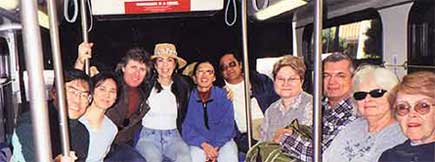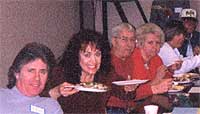
What you see here is a group of happy people on their way
to the San Diego Zoo. What makes these people unique is
that they share the same illness: Tinnitus.
Helping Herself
by Helping Others
These people also share with each other their fears, their stories, and ultimately their ongoing recovery from a terrible illness. But this little journey did not happen on its own. It was made possible by one individual’s desire to help herself by helping others.
Mari Quigley (center wearing hat) is not a person who takes things lying down. Nor is she someone who lets self pity or resentments derail her from enjoying life. “Sometimes you have to go through something really bad to appreciate the good.”
Hard News
In 1997, this Southern California native was diagnosed with an acoustic neuroma, a benign brain tumor that forms on the eighth cranial nerve beyond the inner ear. It was already affecting her tinnitus and her hearing. Mari had begun experiencing tinnitus, which can be a symptom of acoustic neuroma, in 1995. But it wasn’t until 1997, when tinnitus began affecting her health, that she discovered the tumor.
Acoustic neuromas usually grow very slowly, but as they expand they can crowd or displace normal tissue and if left untreated can actually start growing into the eighth nerve. If it is allowed to get too large it can interfere with brain functions and even cause death.
Tough Decision
Unfortunately, Mari’s tumor was growing at a rapid rate and decisions had to be made as to which treatment she would accept – microsurgery or radiation. Both treatments came with certain risks. Microsurgery is the most common, however side effects can include hearing loss in the affected ear, facial paralysis, loss of balance, decreased mental alertness, and headache, nausea, and vomiting. Radiation takes three to six weeks and can also affect hearing, balance and facial numbness. Five to ten percent of these radiated tumors will continue to grow..
After much deliberation and having consulted with friends and her doctor, Mari chose surgery. “I just didn’t want to have something inside of me,” she recalled. “I turned it over to God.” Mari credits her faith as being instrumental in pulling her through.
After six days in the hospital, half spent in intensive care, Mari went home to recover from an assortment of side effects. “I had to learn to walk again. I couldn’t hear in my left ear and my right ear was ringing. My eye wouldn’t shut and I had the worst headaches.” Yet through the whole ordeal Mari refused to feel sorry herself, ” I’m a real positive person, and I wanted to move forward.”
A Good Attitude
With her upbeat attitude, her recovery went exceedingly fast despite such an invasive procedure. In two weeks she was in the gym doing exercises her doctor suggested to rejuvenate her body. But Mari also felt the need to rejuvenate her mind and spirit as well.
 Even though the neuroma was gone – the tinnitus remained, now in both ears. Sensing the best way to support herself would be through supporting others, she formed the Orange County Tinnitus Support Group in 1998.
Even though the neuroma was gone – the tinnitus remained, now in both ears. Sensing the best way to support herself would be through supporting others, she formed the Orange County Tinnitus Support Group in 1998.
Immediately the tools for self help became clear. Sharing personal experiences with others with a common problem could provide valuable resources and meaningful help during difficult times. The group meets to discuss coping strategies, treatments and to provide each other a truly understanding ear. “It’s a really nice group, sometimes big, sometimes little. People tell me ‘I love your meetings’ because we focus on sharing our strengths and hopes with each other.”
A Great Philosophy
Mari’s theory is that “you can have fun and tinnitus too. So the members of the Orange County Tinnitus Support Group “each grabbed their best friend and took [their] tinnitus to the San Diego Zoo.” As Mari recalls, “We saved up a bunch of money and used it to help out with food and such when we got there. It was really fun taking the train… which by the way was very quiet. Everyone had a great time and we are going to plan another ‘get together’ this year along with our annual Christmas party. We always have fun singing and enjoying good food and friends who are all very grateful they found one another… for a lot of us were suicidal and coming together in a group like this has been a life saver.”
Note: If you’d like to know more about forming a tinnitus support group in your community contact the American Tinnitus Association at 1-800-634-8978
